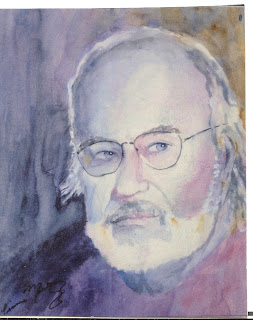THOUGHTS ON RICHARD YOUNG'S DEATH
The Rev. Dana Prom Smith, S.T.D., Ph.D. (9/22/08)
In his book, Religion in the Making, Alfred North Whitehead wrote: "Religion is what individuals do with their solitariness." John Donne said it more elegantly in his Meditation 17. "Any man's death diminishes me because I am involved in mankind, and, therefore, never send to know for whom the bell tolls, it tolls for thee."
Although we are surrounded by a host of friends and loved ones, we, the bereaved, are still alone in our solitariness because grief is a solitary business, as Saint Paul said, "with sighs too deep for words." The bell has tolled.
We're no longer living with syllogisms, validations, demonstrations, and proofs, that is, with things we know because we are no longer in the preliminaries, but in the final event, that last round.
We're now dealing with faith and belief, those experiences we cannot validate yet which underlie what we know. As W.T. Stace pointed out, the statement "I am an atheist" is a creed, a statement of belief in which people in a curious anomaly proclaim their beliefs by saying they don't have any which is, of course, a belief.
We have moved from what we know to what we believe. We have gone from fact to value, the fact of death to the value of life. Richard's death makes us come to terms not only with the value of his life, but also the value of ours.
Now, Richard, as with all of us, had his idiosyncrasies, partly due to his massive intelligence. What we saw of his mind was but a sliver of what was going on inside of him.
However, unlike most massively intelligent people he was aware of the common and the everyday, of trees, of sports, of animals, of politics, loving it all. Even though his theology was a bit slim, he could still mount a spirited argument by which he affirmed that which he disputed.
In short, Richard loved life and valued it which is the legacy he left us, challenging us in his death with his love of life which is, of course, but an act of faith. He was a kind man which is a sure sign that he loved life. He didn't want to piss it away in anger and resentment and bitterness. As the Psalmist said, "Teach us to number our days that we may apply our hearts unto wisdom."
Again, Whitehead said there is always a quality of life that underlies the fact of life, and the measure of that quality is in our beliefs, not our knowledge. Richard had a beautiful quality and his death challenges all of us with that beauty.
A Presence, which is not an object in our minds, but an incomprehensible Presence, abides and infuses the allness of our lives. Not quantifiable, experienced in Elijah's "still, small voice," as the Hound of Heaven, that Presence pursues us down the hallways of our years.
As an adult for 65 years, spent as a soldier, laborer, spy, student, jail bird, writer, teacher, columnist, minister of the gospel, and psychotherapist, I have something to say on these matters. We either believe in life or death. We're either lovers of life or lovers of death. Behind it all, the quality of our beliefs transforms the fact of our lives into an aesthetic experience which once embraced yields a life of joy. Richard was a beautiful man, exemplifying the aesthetics of his beloved, elegant mathematics.
As I was thinking about what I was going to say, I was listening to Mozart's Requiem which is a great place to begin when thinking about death because Mozart explores the meaning of death and faith with a profundity of feeling and clarity of mind. Now, I would like you all to stand and bow your heads as I conclude with the opening words of its chorus, Requeim aeternam dona eis, Domine, O Lord, grant him eternal rest. Amen.


0 Comments:
Post a Comment
<< Home